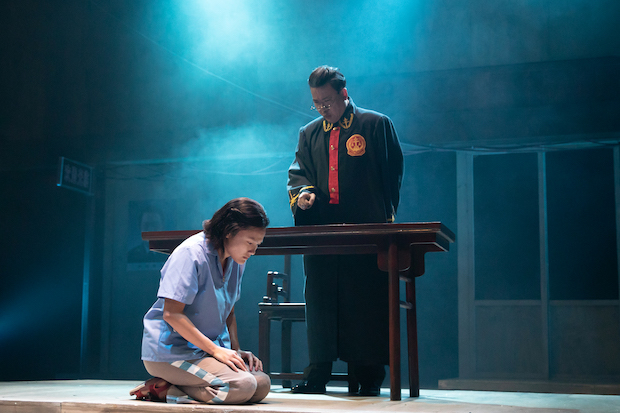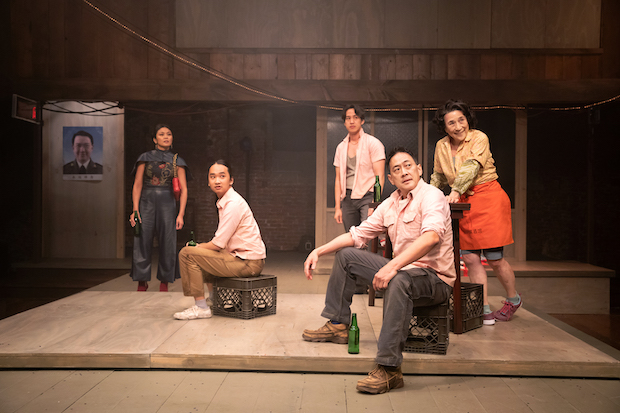Moving Heaven and Earth to Right a Great Wrong in Snow in Midsummer
Frances Ya-Chu Cowhig’s adaptation of a classic Chinese drama makes its New York premiere at Classic Stage Company.

(© Julieta Cervantes)
Guan Hanqing's 13th-century play The Injustice to Dou Yi is a relatively straightforward affair that chronicles a harrowing miscarriage of justice and the earth-shaking consequences that lead to a great wrong being eventually righted. For Snow in Midsummer, her contemporary adaptation of the classic Chinese work, however, Frances Ya-Chu Cowhig has not only added modern elements and themes to the plot — a capitalist takeover, a gay relationship, black-market organ harvesting — but also reconfigured it as a supernatural murder mystery. The result, at least as presented by Classic Stage Company in the shaky New York premiere production opening tonight, is admirable but diffuse.
In Cowhig's version, Dou Yi (Dorcas Leung) — who, before the events of the play, was executed for a murder she did not commit — is a ghostly presence who stalks the lives of various characters in the town of New Harmony. In particular, she possesses the body of Fei-Fei (Fin Moulding), the adopted daughter of Tianyun (Teresa Avia Lim), a self-made businesswoman who is on the verge of taking over the factories in town, even during a three-year-long drought, which is one of the three prophecies Dou Yi uttered just before her death (one of the other prophecies gives the play its name). Tianyun is taking control of the factories from Handsome Zhang (John Yi), whose father (played in flashbacks by Kenneth Lee) Dou Yi was executed for supposedly murdering. Tianyun's subsequent search for the truth surrounding the deaths eventually affects Handsome's partner, Rocket Wu (Tommy Bo), with whom he had planned to flee New Harmony so that they could spend their lives together in romantic ecstasy.

(© Julieta Cervantes)
For those who aren't familiar with the original Guan Hanqing play, it's worth avoiding even a Wikipedia summary of the drama in order to be fully surprised by the many twists of Cowhig's Guan-inspired narrative. Perhaps then one could at least appreciate Snow in Midsummer on the level of a lurid potboiler. And yet, even on that level, Cowhig's version feels too cerebral to fully satisfy. As intriguing an idea as it is to use Guan's play as a springboard for a kaleidoscopic, critical portrait of modern Chinese society — encompassing everything from the gentrification wrought by capitalism to still-existing gender and sexual discrimination — Snow in Midsummer eventually suffers from the weight of its myriad ambitions and plot convolutions.
Or perhaps it simply feels unsatisfying under Zi Alikhan's rather tentative and uncertain direction. Though John Doyle, Classic Stage Company's artistic director, didn't direct this production, Alikhan's staging feels reminiscent of Doyle's "less is more" aesthetic approach, with the actors moving a single table in the middle of the theater's central raised platform to indicate changes of setting (the collective Dots is credited with the rest of the scenic design). Such an approach doesn't do Cowhig's grandly ambitious work any favors. The resulting production feels bereft of a through line, as if Alikhan never quite settled on a consistent tone to bind its disparate elements together.
Snow in Midsummer also disappoints as a horror spectacle. Though lighting designer Jeanette Oi-Suk Yew comes up with some atmospheric uses of backlights and spotlights, and Alikhan makes memorably perverse use of Chinese pop legend Teresa Teng's classic tune "The Moon Represents My Heart," most of the attempts to drum up scares feel clumsy at best. It's a bad sign when Dou Yi's possession of Fei-Fei — represented by both characters facing each other and saying the same foreboding lines in sync — comes off as more goofy than chilling.

(© Julieta Cervantes)
The performers do their best to imbue the proceedings with the necessary life-or-death stakes, but many of the actors appear to mistake frantic high-pitched yelling for feverish "intensity." Only some of the older performers — Wai Ching Ho is a particular standout as both Nurse Wong, the owner of a local New Harmony bar, and Dou Yi's mother, Mother Cai — evince an understanding of how to modulate their performances to convey anger and menace.
All of this is a pity, because in many ways Snow in Midsummer is a fascinating attempt to update an ancient work of theater, drawing on the elements that has made it such a mainstay of the Chinese stage and bringing it to a contemporary audience in a way that speaks across generations and cultures. As arguably overstuffed as it is, Cowhig's laudable adaptation deserves a better production than it gets here.








